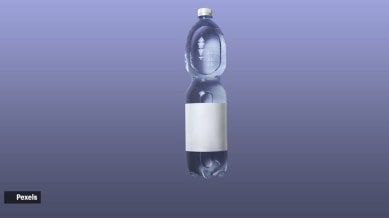📣 For more lifestyle news, click here to join our WhatsApp Channel and also follow us on Instagram
White, black, green or blue: What the colours of packaged drinking water bottle caps indicate
From a medical perspective, safe, clean drinking water is the most important factor, regardless of cap colour.

When you buy a bottle of packaged drinking water, do you ever pay attention to the colour of its cap? Well, if social media is to go by, each colour — red, blue, green, white, black — indicates a different type of water. Is there any truth to this claim? We reached out to experts to help us decode this in detail.
Dr Aniket Mule, consultant in internal medicine at KIMS Hospitals, Thane, noted that the colour of a bottle cap often indicates the type of water being consumed. “While some people think it’s just for branding, manufacturers often use colours to tell different water types apart, like alkaline, mineral, or flavoured water. However, there are no medical or regulatory rules for these colour codes, so it’s always safer to check the label to know exactly what you’re consuming,” said Dr Mule.
monthly limit of free stories.
with an Express account.
Do different colours mean different types of water?
In most cases, yes, said Dr Mule.
Here’s what some common cap colours usually signify:
Black caps: Usually alkaline water, marketed for its high pH, which may help reduce acidity in the body.
Blue caps: Often spring water, known for its natural mineral content.
White caps: Typically processed or filtered water, offering simple, clean hydration.
Green caps: Often flavoured water with added taste, appealing to those who want variety.
Clear caps: May represent natural spring water or distilled water, which is free from minerals and contaminants.
Red caps: Usually electrolyte-enhanced water, great for replenishing minerals after exercise or dehydration.
Yellow/Golden caps: Often vitamin-enriched water, designed to boost nutrition along with hydration.
Which is better for you?
From a medical perspective, safe, clean drinking water is the most important factor, regardless of cap colour. “While mineral or electrolyte-enhanced options may help people with specific needs, like athletes or those with deficiencies, for most healthy individuals, regular packaged or spring water is enough for daily hydration. Claims that alkaline or vitamin-enriched water offers major health benefits lack strong scientific support,” said Dr Mule.
What to note?
Always check the label for ISI or FSSAI certification, expiry date, and storage conditions, Dr Mule emphasised. Choose based on your health needs instead of just the cap colour. If you have medical issues like kidney disease or electrolyte imbalances, talk to your doctor before switching to speciality waters.
DISCLAIMER: This article is based on information from the public domain and/or the experts we spoke to. Always consult your health practitioner before starting any routine.
📣 For more lifestyle news, click here to join our WhatsApp Channel and also follow us on Instagram